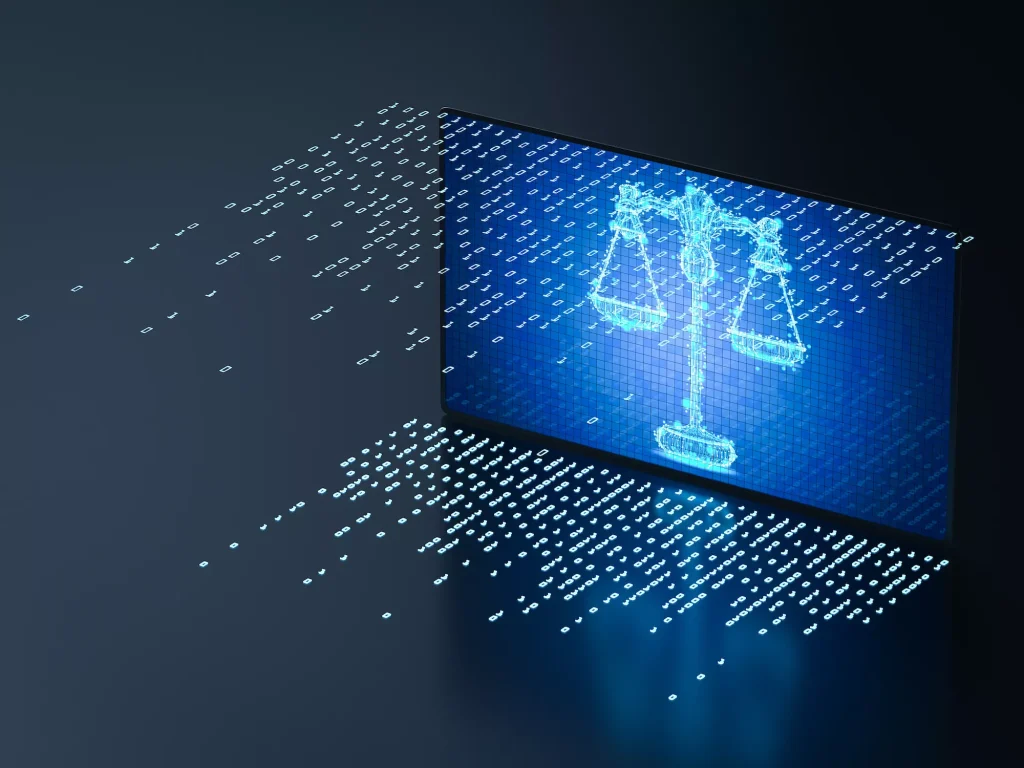Blockchain technology is revolutionizing the way law works, bringing accessibility, transparency, and cost savings to the table. Imagine digitally signing and storing legal agreements with ease, automating tasks through smart contracts, and accessing a shared ledger accessible by all parties involved. It’s time to embrace the power of blockchain in law – it’s changing the game for good.
Blockchain for Increased Accessibility in Legal Processes
Blockchain allows you to streamline and simplify transactional work, digitally sign and store legal agreements, use smart contracts for automated contract management, and reduce time spent on preparing and maintaining law documents. By leveraging blockchain technology, the legal industry can significantly improve accessibility and ensure inclusivity in legal processes. Through the use of a shared ledger accessible by all parties involved, blockchain enhances transparency and enables remote collaboration. This eliminates the need for physical presence or face-to-face meetings, making legal services more accessible to individuals who may face geographical or logistical constraints. Additionally, blockchain streamlines processes by automating tasks such as document verification and compliance checks. This not only enhances efficiency but also reduces the risk of errors or misinterpretation. Overall, blockchain technology revolutionizes the way legal work is conducted, making it more accessible, efficient, and inclusive for everyone involved.
Enhancing Transparency in the Legal Sector With Blockchain
By utilizing blockchain technology, the legal sector can achieve enhanced transparency, giving stakeholders a clearer understanding of transactions and contracts. Blockchain’s impact on legal transparency is significant, as it promotes accountability and trust within the industry. With a shared ledger accessible to all parties involved, there is no room for misinterpretation or surprises in agreements. Additionally, blockchain plays a crucial role in secure document authentication by ensuring authenticity. Through decentralized verification mechanisms, the risk of fraudulent documents is greatly reduced. Furthermore, blockchain has the potential to revolutionize ownership in intellectual property rights. By creating immutable records of ownership and enabling direct licensing through smart contracts, artists and creators can have better control over their work. In terms of regulatory compliance, blockchain automates functions such as tax compliance and reporting. This improves efficiency and reduces human error while enhancing transparency and trust in compliance processes. Lastly, blockchain has an impact on legal dispute resolution by providing efficient and low-cost solutions through automated arbitration systems powered by smart contracts.
| Blockchain’s Impact on Legal Transparency | Blockchain’s Role in Secure Document Authentication |
|---|---|
| Accountability and trust | Ensuring authenticity |
| Clearer understanding of transactions | Reduced risk of fraudulent documents |
| No room for misinterpretation | Decentralized verification mechanisms |
| Blockchain’s Potential in Intellectual Property Rights | Blockchain’s Influence on Regulatory Compliance |
|---|---|
| Revolutionizing ownership | Automating functions |
| Immutable records of ownership | Improved efficiency |
| Direct licensing through smart contracts | Reduced human error |
Blockchain’s Impact on Legal Dispute Resolution |
———————————————- |
Efficient and low cost |
Automated arbitration systems |
Cost Reduction and Automation in Law Through Blockchain
Lower your legal fees and accelerate transactions by leveraging the cost reduction and automation capabilities of blockchain technology. Blockchain is revolutionizing the legal industry by automating legal processes, reducing manual labor, cutting costs, increasing efficiency, and improving productivity. With blockchain, you can automate tasks such as drafting and amending legal documents, saving hours of manual work. By streamlining administrative tasks and transactional work through automation, you can accelerate legal proceedings without sacrificing quality or accuracy. This not only reduces the time spent on preparing law documents but also lowers lawyer fees by passing cost savings to clients. Additionally, smart contracts enable transparent and cost-efficient management of escrow accounts, further enhancing overall demand for legal services while lowering friction and costs in both the legal and financial sectors.
The Role of Blockchain in Limited Liability Autonomous Organizations (LAOs)
LAOs, or limited liability autonomous organizations, allow you to invest in early-stage Ethereum ventures and share in the profits. These organizations provide a unique opportunity for decentralized governance and profit sharing. One of the key aspects of LAOs is their legal wrapping, which ensures that they operate within the boundaries of existing regulations. This legal wrapping is critical for LAOs to function effectively and gain legitimacy in the traditional legal system.
Through LAOs, you can participate in early stage investments, supporting innovative projects on the Ethereum platform. This integration with decentralized autonomous organizations (DAOs) enables you to contribute to the growth and development of the blockchain ecosystem. By investing in these ventures, you have the chance to be part of groundbreaking technologies and potentially earn significant returns on your investment.
Other Applications of Blockchain in the Legal Industry
Blockchain technology has the potential to revolutionize and automate regulatory compliance processes in the legal industry. It can be used for various purposes, including legal contracts, identity verification, evidence management, dispute resolution, and supply chain management. With blockchain for legal contracts, you can create secure and transparent agreements that are stored on a decentralized ledger. This ensures that all parties have access to the same information and eliminates the need for intermediaries. Blockchain for legal identity allows for secure verification of individuals’ identities, reducing fraud and increasing trust in online transactions. Additionally, blockchain can be used to store and authenticate legal evidence, ensuring its integrity and reliability. In terms of dispute resolution, blockchain-based systems can provide low-cost and efficient solutions by automating arbitration procedures. Lastly, blockchain can improve supply chain management by enabling transparent tracking of goods from production to delivery.
Blockchain’s Impact on Automated Regulatory Compliance
In the previous subtopic, we explored various applications of blockchain in the legal industry. Now let’s delve into how blockchain is impacting automated regulatory compliance. Here are three key ways:
- Automated Compliance Management: Blockchain technology enables the creation of a shared ledger system where parties can automatically report compliance data and documentation. This automation improves efficiency and reduces human error in regulatory compliance processes.
- Tax Compliance Automation: Blockchain-based frameworks can automate functions such as tax compliance, streamlining the process and ensuring accuracy. This automation not only saves time but also increases efficiency in meeting regulatory requirements.
- Transparency and Trust: By utilizing blockchain, compliance processes become more transparent, allowing stakeholders to have better visibility into transactions and smart contracts. This transparency enhances trust in compliance procedures while minimizing misinterpretation or manipulation.
Overall, blockchain technology has the potential to revolutionize automated regulatory compliance by increasing efficiency, transparency, and trust in these crucial processes within the legal industry.
Blockchain and Machine-to-Machine (IoT) Payments in Law
Smart contracts utilizing blockchain technology provide a secure and transparent interface for machine-to-machine (IoT) payments in the legal industry. By leveraging the decentralized nature of blockchain, smart contracts enable efficient and trustworthy transactions between IoT devices without the need for intermediaries. This has significant implications for various aspects of law, including secure document authentication, intellectual property rights management, regulatory compliance, and dispute resolution.
| Blockchain Applications in Law | Benefits |
|---|---|
| Secure Document Authentication | Ensures integrity and authenticity of legal documents |
| Intellectual Property Rights | Simplifies ownership transfer and enables direct licensing |
| Regulatory Compliance | Automates compliance processes and enhances transparency |
| Dispute Resolution | Provides low-cost arbitration through smart contracts |
With blockchain-based IoT payments, the legal industry can streamline payment processes while maintaining security and transparency. Additionally, blockchain technology can be utilized to authenticate legal documents securely, simplifying ownership transfers in intellectual property rights. It also plays a vital role in regulatory compliance by automating functions such as tax compliance and improving efficiency while reducing human error. Lastly, blockchain-based dispute resolution systems offer low-cost options for resolving conflicts through programmable smart contracts. Overall, blockchain technology offers numerous benefits to the legal industry by increasing efficiency, reducing costs, and enhancing trust in transactions.
Creating Blockchain-based Arbitration Systems
To embrace the future of dispute resolution, consider leveraging the benefits of creating arbitration systems based on blockchain technology. Here’s how it can revolutionize the way disputes are resolved:
- Blockchain-based dispute resolution: By programming agreements into smart contracts, you can automate the arbitration procedure and enforce arbitral awards. This not only ensures a transparent and efficient process but also reduces costs associated with traditional dispute resolution methods.
- Integrated reputation systems: Blockchain technology allows for the integration of reputation systems, which can help in selecting arbitrators for resolving disputes. This enhances trust and accountability in the arbitration process.
- Low-cost resolution and globally accessible judicial system: With blockchain-based arbitration systems, you can benefit from low-cost dispute resolution that is accessible to parties from around the world. This eliminates geographical barriers and creates a globally inclusive judicial system.
Product Spotlight: Automated Convertible Note in Law
The automated convertible note resource offers you a flexible funding solution for your early-stage company. With this resource, you can quickly and easily create customizable notes based on US market standards. These automated convertible notes provide a financing solution that can be tailored to meet the specific needs of your business. Whether you need funding for expansion, product development, or hiring new talent, the automated convertible note resource has got you covered. It allows you to access the funds you need while offering flexibility in repayment terms and conversion options. Say goodbye to complicated financing processes and hello to a streamlined and efficient way of raising capital for your early-stage company.
Future Implications and Opportunities of Blockchain in the Legal Profession
Collaboration between legal professionals and technologists is crucial for understanding the future implications and opportunities of blockchain in the legal profession. As blockchain technology continues to evolve, it presents various possibilities for the legal industry. Here are some key areas where blockchain can have a significant impact:
- Collaborative innovation: Legal professionals and technologists working together can drive innovative solutions that leverage blockchain technology to streamline processes and improve efficiency in the legal sector.
- Disruptive business models: Blockchain has the potential to disrupt traditional business models by enabling new ways of conducting transactions, such as using smart contracts and decentralized platforms.
- Technological integration: Integrating blockchain into existing legal systems can enhance access to justice by creating a transparent and secure environment for storing and accessing legal information.
However, there are also regulatory challenges that need to be addressed, such as ensuring compliance with existing laws and regulations while embracing the benefits of blockchain technology. By collaborating effectively, we can navigate these challenges and unlock the full potential of blockchain in the legal profession.



